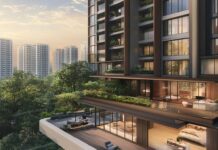Real estate in Singapore is shaped by policies aimed at maintaining balance in the housing sector while promoting sustainable urban growth. For property buyers and investors, these measures can influence affordability, profitability, and long-term value.
Key Points
- Stamp duties are a major cost consideration for buyers.
- Cooling measures regulate demand and stabilize housing prices.
- Foreign ownership rules impact investment strategies.
- Land scarcity drives innovation in housing projects.
Balancing Development and Demand
One standout example of strategic development is Orie, a project by Frasers Property in collaboration with City Developments Limited (CDL) and Sekisui House. This condominium showcases the harmony of urban living and sustainability. Orie is part of a broader effort to align housing projects with Singapore’s policies, emphasizing eco-consciousness and community-centric design.
Projects like this reflect how developers are responding to land scarcity by maximizing available resources. For investors, such developments offer a glimpse into the future of residential spaces, where functionality meets environmental responsibility.
Stamp Duties: A Significant Cost for Buyers

Stamp duties are central to policies regulating property purchases. Buyers face costs such as the Additional Buyer’s Stamp Duty (ABSD) or the Seller’s Stamp Duty (SSD).
Key Policies
- ABSD: Foreign buyers often face higher rates, which reduces speculative purchases.
- SSD: Sellers incur charges if they dispose of properties within a few years, discouraging short-term investments.
These measures impact affordability and profitability. For example, an investor purchasing a second residential property must account for higher upfront costs, which could alter their investment strategies.
Cooling Measures: Regulating Demand
To stabilize the housing market, cooling measures aim to curb speculative activities and maintain affordability. Regular adjustments ensure market conditions remain balanced.
Recent Changes
- Loan-to-Value Limits: Lower limits reduce borrowing power, especially for multiple-property owners.
- Total Debt Servicing Ratio: This limits buyers’ ability to stretch finances across loans.
Investors often find themselves recalibrating their strategies to align with these regulations. A focus on long-term gains becomes more practical than chasing short-term spikes in property value.
Land Scarcity and its Ripple Effects

Singapore’s limited land area presents unique challenges for urban planning and housing. Policymakers encourage high-density developments and sustainable practices to maximize usage.
Innovations Driven by Scarcity
- Vertical Developments: Mixed-use buildings offer residential, retail, and office spaces under one roof.
- Green Spaces: Developers like CDL integrate gardens and recreational areas into their projects.
For investors, this creates opportunities in integrated developments where demand remains strong due to convenience and connectivity.
Foreign Ownership: Striking a Balance
Foreign ownership rules are carefully crafted to protect local buyers while attracting overseas investors. Restrictions on residential properties limit foreign acquisition, while commercial spaces remain accessible.
Key Takeaways for Investors
- Residential Market: Limited opportunities for foreign buyers ensure locals have priority.
- Commercial Market: Greater flexibility makes it a lucrative avenue for international investors.
The dynamic encourages diversification. Local buyers dominate the residential scene, while international capital flows into commercial real estate.
Environmental Sustainability in Housing

Sustainability is at the core of many developments in Singapore. Developers like Sekisui House lead the charge with eco-conscious designs. These efforts align with policies promoting green initiatives.
Benefits for Buyers
- Energy Efficiency: Reduced utility costs enhance affordability.
- Future-Proof Investments: Eco-friendly homes align with global trends, boosting resale value.
Navigating Policy Changes
Property buyers and investors must stay informed about policy changes to adapt their strategies effectively.
Tips for Staying Ahead
- Monitor Announcements: Regular updates ensure compliance and smarter planning.
- Seek Professional Advice: Real estate agents and legal consultants can offer clarity.
- Diversify Investments: Explore commercial properties or REITs for flexibility.
Conclusion
Singapore’s real estate market thrives on a delicate balance of regulation and innovation. Policies shape opportunities and challenges, making it essential for property buyers and investors to remain adaptable. Some developments showcase the integration of sustainability and functionality, paving the way for a dynamic housing future.
Staying informed and aligning strategies with policy changes can turn challenges into opportunities. Smart investments in Singapore’s property market require vigilance and strategic foresight.




